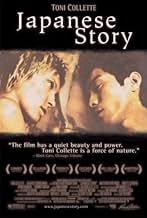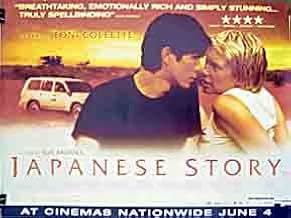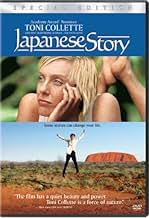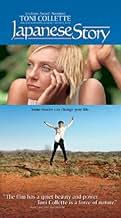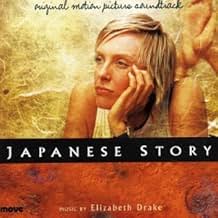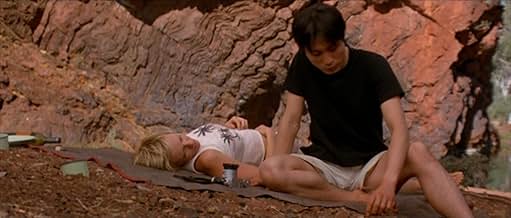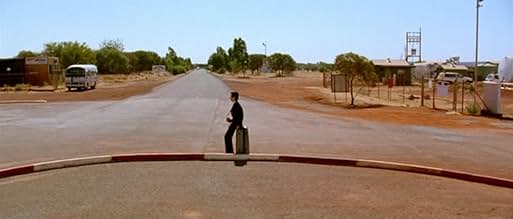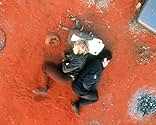VALUTAZIONE IMDb
6,8/10
6904
LA TUA VALUTAZIONE
Un geologo e un giapponese che trova fastidioso rimangono bloccati nel deserto di Pilbara: una delle regioni più remote della Terra.Un geologo e un giapponese che trova fastidioso rimangono bloccati nel deserto di Pilbara: una delle regioni più remote della Terra.Un geologo e un giapponese che trova fastidioso rimangono bloccati nel deserto di Pilbara: una delle regioni più remote della Terra.
- Regia
- Sceneggiatura
- Star
- Premi
- 20 vittorie e 13 candidature totali
Jules Hutchinson
- Canteen Worker
- (as Jules Hutchison)
Recensioni in evidenza
In an age when criticism has become debased and few people are really certain about what constitutes true worth in art, it is difficult to use the word "masterpiece" about any film. And yet that word is applicable here. At first this film appears to be just a bog-standard romantic love story, in the Hollywood mould, about two very different characters who meet and fall in love in unusual circumstances. Opposites attract, and so on.
However, as the story unfolds one becomes aware that there are many more levels to it than one would normally expect. Everything, from the title to incidental characters and the spectacular images of the desert, has been carefully thought out. It raises profound questions about a fashionable subject: identity, but also about love itself. Are these characters in love, or is it merely the terrifying starkness of the Australian outback that has thrown them together? Finally a third person enters the relationship, who complicates matters even further. Despite the romantic overtones of this film it is lifted, ultimately, by its absolute realism. Small gestures betoken whole story lines and glimpses of other characters throw the protagonists into sharp relief. Other influences begin to trickle through: Yasujiro Ozu, Peter Weir (in his early days), Japanese Haiku. And yet this is an entirely original work.
This film had a huge emotional impact on me, but it also made me think, about my own life and about the choices I've made. It did everything that a genuine work of art should do, and without any of the fanfare that we, in the West, have come to associate with art. Small wonder that it got little of the attention that in previous eras it would have attracted. Watch it, and discover that it is still possible to make a classic.
However, as the story unfolds one becomes aware that there are many more levels to it than one would normally expect. Everything, from the title to incidental characters and the spectacular images of the desert, has been carefully thought out. It raises profound questions about a fashionable subject: identity, but also about love itself. Are these characters in love, or is it merely the terrifying starkness of the Australian outback that has thrown them together? Finally a third person enters the relationship, who complicates matters even further. Despite the romantic overtones of this film it is lifted, ultimately, by its absolute realism. Small gestures betoken whole story lines and glimpses of other characters throw the protagonists into sharp relief. Other influences begin to trickle through: Yasujiro Ozu, Peter Weir (in his early days), Japanese Haiku. And yet this is an entirely original work.
This film had a huge emotional impact on me, but it also made me think, about my own life and about the choices I've made. It did everything that a genuine work of art should do, and without any of the fanfare that we, in the West, have come to associate with art. Small wonder that it got little of the attention that in previous eras it would have attracted. Watch it, and discover that it is still possible to make a classic.
8=G=
It would be impossible to say anything substantially meaningful about "Japanese Story" without spoiling the film for those who have not seen it. Suffice it to say, it's set in Australia and works with a an Aussie woman (Colette) and a Japanese man (Hiromitsu) to build slowly to an emotionally potent situation - a series of moments - and then lingers in the denouement allowing the audience to savor the emotions evoked. For some, those feelings may be nil. For others they may be powerful and overwhelming. Personally, I wept. Objectively, the film, about a woman by women, is well crafted and Colette's performance is outstanding. The film deserves high marks in all aspects from cinematography to music to casting, etc. However, when the closing credits roll, your experience will have been as unique as yourself. And whatever that experience is, it will be less if you know the outcome in advance. (B+)
Spoilers - hopefully kept to a minimum, but you are duly warned !!
Thanks to the summary line 'The less you know about this film, the better', I curbed my urge to find out more about this film before watching it, something that I'm often tempted to do. If I had known the full plot, I would have been deprived of the dramatic experience of fully empathising with the emotions of the characters.
As others have said, this film is in three parts, call it three acts if you like plays or three movements if you like concertos. The first part is rather cliché, even banal, perhaps by intention. The scene of being stuck in the sand with the wheels spinning feverishly but going nowhere does strike a chord with those of us who have had similar experiences, on sand as well as on snow. The second part starts to intrigue and has all the necessary build-up. It's the third and final part, however, that has given me a cinematic experience that I've never had before. 'Powerful' will be an understatement. 'Powerful' however is not a fair description, because the word conjures up an image of being hit by an abrupt emotional blow. It's not quite like that. There's a sustained drive of waves of emotions, layer after layer. I know I'm getting myself into a lot of trouble saying this, but I think that it needs a woman director to pull this off. It also needs an actress in the caliber of Toni Colette.
Can't finish without mentioning the music. There are in fact a lot of scenes with absolutely no sound, not even the ambiance noise of the vast outback. But when there is music, they're the best. One good example is the love-making scene. But that is soon dwarfed compared with the hauntingly beautiful piece of music that is the background, sometimes just noticeable, sometimes coming forth, throughout the last twenty minutes of the film. Essentially, it alternates between a simple phrase of 8 notes on a plucked instrument and a haunting soprano chorus, blending in perfectly with the mood of the film.
Thanks to the summary line 'The less you know about this film, the better', I curbed my urge to find out more about this film before watching it, something that I'm often tempted to do. If I had known the full plot, I would have been deprived of the dramatic experience of fully empathising with the emotions of the characters.
As others have said, this film is in three parts, call it three acts if you like plays or three movements if you like concertos. The first part is rather cliché, even banal, perhaps by intention. The scene of being stuck in the sand with the wheels spinning feverishly but going nowhere does strike a chord with those of us who have had similar experiences, on sand as well as on snow. The second part starts to intrigue and has all the necessary build-up. It's the third and final part, however, that has given me a cinematic experience that I've never had before. 'Powerful' will be an understatement. 'Powerful' however is not a fair description, because the word conjures up an image of being hit by an abrupt emotional blow. It's not quite like that. There's a sustained drive of waves of emotions, layer after layer. I know I'm getting myself into a lot of trouble saying this, but I think that it needs a woman director to pull this off. It also needs an actress in the caliber of Toni Colette.
Can't finish without mentioning the music. There are in fact a lot of scenes with absolutely no sound, not even the ambiance noise of the vast outback. But when there is music, they're the best. One good example is the love-making scene. But that is soon dwarfed compared with the hauntingly beautiful piece of music that is the background, sometimes just noticeable, sometimes coming forth, throughout the last twenty minutes of the film. Essentially, it alternates between a simple phrase of 8 notes on a plucked instrument and a haunting soprano chorus, blending in perfectly with the mood of the film.
The best thing about `Japanese Story,' an Australian film directed by Sue Brooks and set almost entirely in the Outback, is its unpredictability. Just as you begin to think that the story, written by Alison Tilson, is headed in one particular direction, it does an amazing about-face and leads us down an entirely different, utterly unexpected narrative path.
The movie starts off as a fairly standard romantic comedy, involving two strangers who don't like each other very much yet who are forced to spend an inordinate amount of time together. Sandy is a geologist whose company, against her will and better judgment, has asked her to escort an important Japanese businessman through the wilds of the Australian desert on a sightseeing tour. The film even begins to seem a bit like a landlocked `Swept Away' for awhile, as these two headstrong people he a Japanese traditionalist with male chauvinistic tendencies and she a no-nonsense, freethinking, independent woman (but both filled with doubts and insecurities beneath the surface) find themselves stranded in a hostile and remote environment, fighting for survival. But then the first of the film's numerous plot reversals kicks in and we find ourselves in an entirely different situation altogether.
I certainly don't want to spoil anyone's experience of this film by revealing just what those plot twists are, so I will merely state that the film, in the second half, becomes a fairly profound meditation on the precarious nature of life and the almost lightning-paced speed with which tragedy can intervene to bring our worlds crashing down around us. Toni Collette is heartbreaking as the feisty yet warmhearted Sandy and Gotaro Tsunashima is both tender and stoic as the man from an exotic culture with whom she eventually falls in love.
That, of course, is the predictable part. But if you think you know where this story is going, you will be pleasantly surprised at how wrong you will be.
The movie starts off as a fairly standard romantic comedy, involving two strangers who don't like each other very much yet who are forced to spend an inordinate amount of time together. Sandy is a geologist whose company, against her will and better judgment, has asked her to escort an important Japanese businessman through the wilds of the Australian desert on a sightseeing tour. The film even begins to seem a bit like a landlocked `Swept Away' for awhile, as these two headstrong people he a Japanese traditionalist with male chauvinistic tendencies and she a no-nonsense, freethinking, independent woman (but both filled with doubts and insecurities beneath the surface) find themselves stranded in a hostile and remote environment, fighting for survival. But then the first of the film's numerous plot reversals kicks in and we find ourselves in an entirely different situation altogether.
I certainly don't want to spoil anyone's experience of this film by revealing just what those plot twists are, so I will merely state that the film, in the second half, becomes a fairly profound meditation on the precarious nature of life and the almost lightning-paced speed with which tragedy can intervene to bring our worlds crashing down around us. Toni Collette is heartbreaking as the feisty yet warmhearted Sandy and Gotaro Tsunashima is both tender and stoic as the man from an exotic culture with whom she eventually falls in love.
That, of course, is the predictable part. But if you think you know where this story is going, you will be pleasantly surprised at how wrong you will be.
10Adetunji
This is, apparently, a love it or hate it movie. As is the case with such films those on one side have a hard time understanding the view of the opposite. I am fully in that camp, I thought this film was stark and beautiful--as moving in its silence and mundane moments as it was illuminating. For those who say there is no plot, well I clearly saw a different film, there is more story and intention in simple small details as there are in a whole series of other films. Toni Collette was amazing and Gotaro Tsunashima was perfect, capturing the emotional compression and exploration of his character with clarity and skill. In a film full of striking absolutely believable and full moments -- the furtive exploratory glances as the two leads drive through the desert, and Toni's fascination with Gotaro's nearly hairless arms say so much about the characters', their history, their assumptions, their prejudices. Incredibly moving, shattering emotionally, and ultimately deeply profound. A haiku-like meditation on living and sharing--I loved it.
Lo sapevi?
- BlooperWhen the QANTAS jet to Kyoto leaves, it is actually leaving from the Perth domestic airport. The international terminal, where it would really leave from, and the Darling Ranges to the east, are clearly visible in the background.
- Curiosità sui creditiOur thanks to the people of Nyamal, Ngarluma, Yinjibarndi, Bunjima and Nyiparli Nations.
- ConnessioniFeatured in Inside Japanese Story: an evening with the film-makers (2004)
- Colonne sonoreABC News Theme
(1986)
Written by Tony Ansell (as T. Ansell) and Peter Wall (as P. Wall)
Published by ABC Music Publishing and
Kindly reproduced with the permission of the Australian Broadcasting Corporation
I più visti
Accedi per valutare e creare un elenco di titoli salvati per ottenere consigli personalizzati
- How long is Japanese Story?Powered by Alexa
Dettagli
- Data di uscita
- Paese di origine
- Siti ufficiali
- Lingue
- Celebre anche come
- Японская история
- Luoghi delle riprese
- Aziende produttrici
- Vedi altri crediti dell’azienda su IMDbPro
Botteghino
- Budget
- 5.740.000 USD (previsto)
- Lordo Stati Uniti e Canada
- 647.054 USD
- Fine settimana di apertura Stati Uniti e Canada
- 23.962 USD
- 4 gen 2004
- Lordo in tutto il mondo
- 4.098.613 USD
- Tempo di esecuzione1 ora 46 minuti
- Colore
- Mix di suoni
- Proporzioni
- 2.35 : 1
Contribuisci a questa pagina
Suggerisci una modifica o aggiungi i contenuti mancanti








